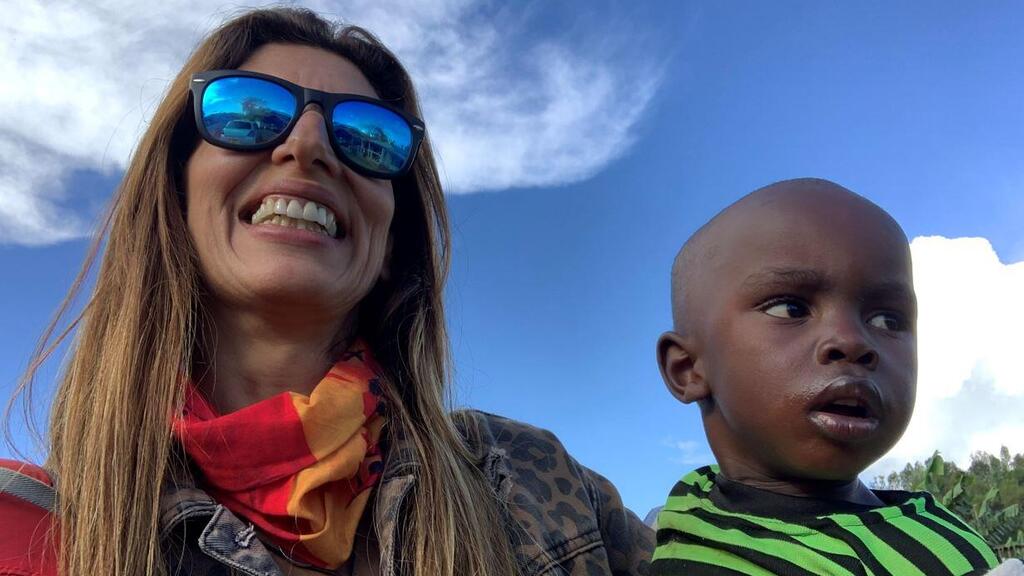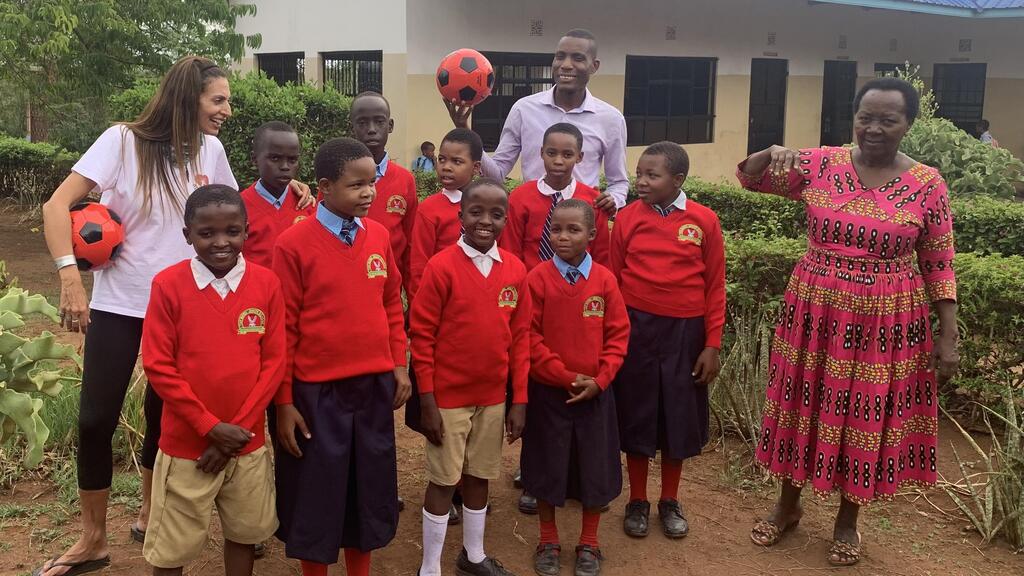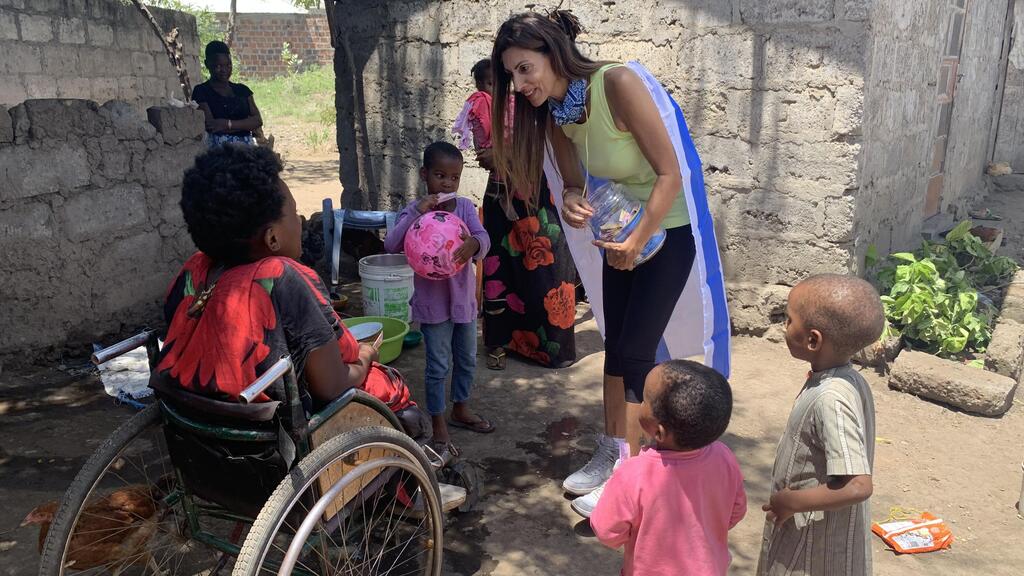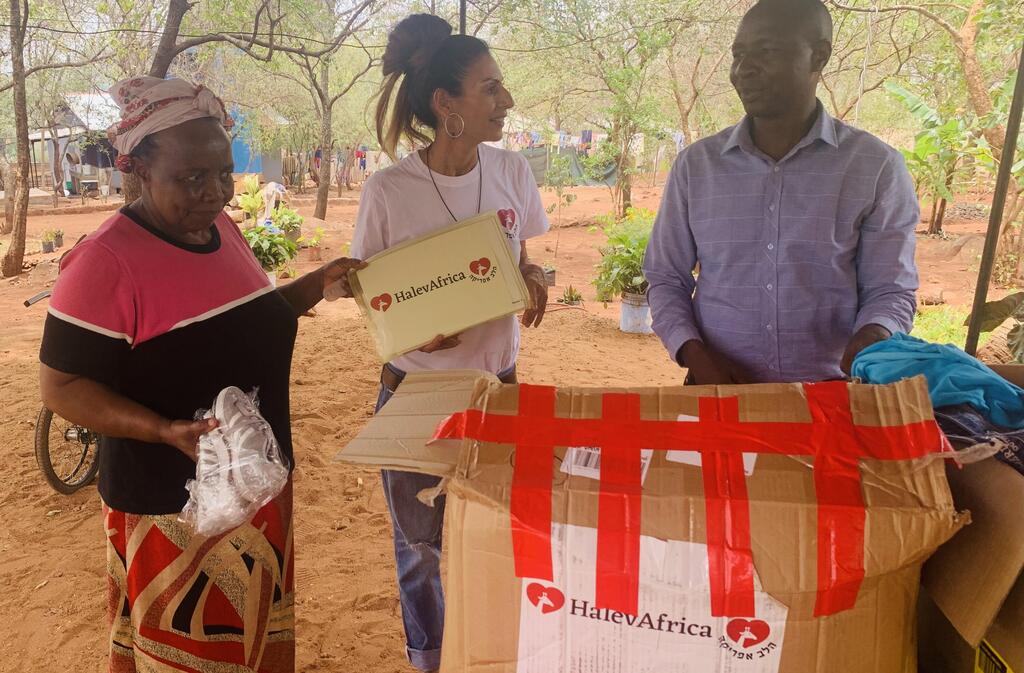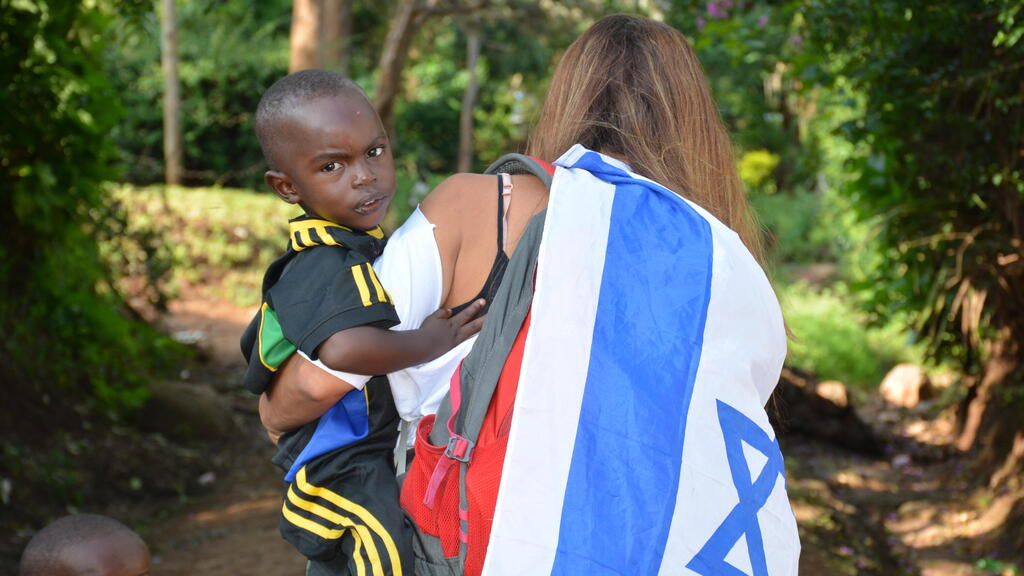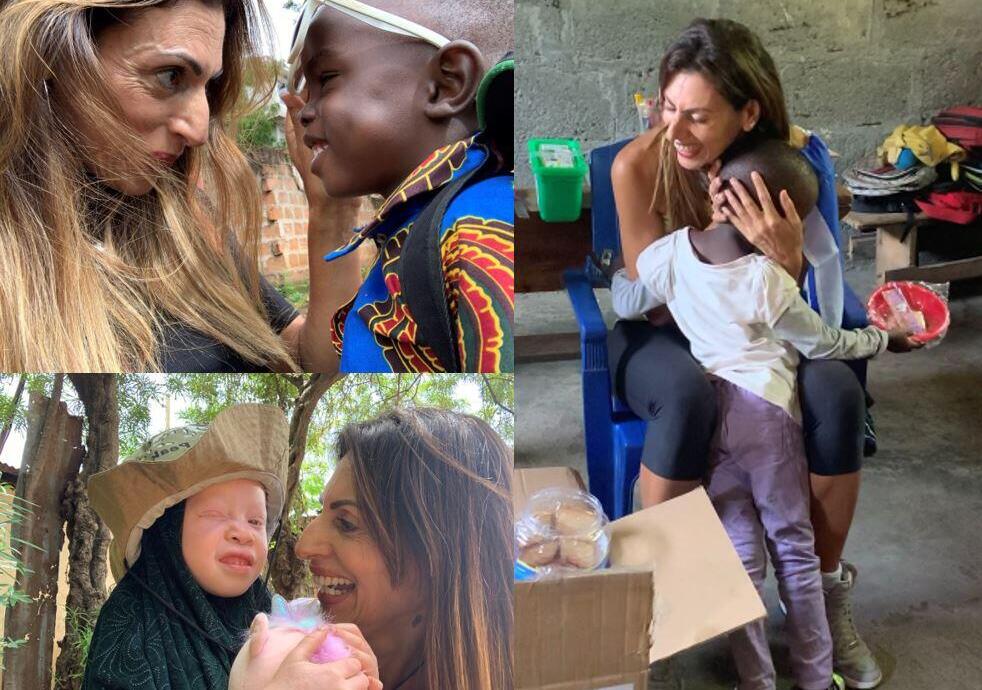In January 2019, a year before COVID changed the world, Ayelet Israeli was off to Tanzania for a change of scenery – a one-off volunteer stint at a Tanzanian orphanage, a treat she gave herself for her 50th birthday.
Before she landed in the East African country, she thought of Tanzania in romantic and altruistic terms. "I was naïve, brave and stupid. I thought I'd volunteer for a short time, and go back to my regular, comfortable life." Three days after arriving she found herself alone, the only adult, in charge of 15 orphans who were completely dependent on her.
"The orphanage director suddenly disappeared and I was left with the children. I couldn't even communicate with them," said Israeli, adding she was shaken by what she saw.
"The poverty is unfathomable. The children are always hungry, but that's not what kills them. There'll always be a bowl of rice or beans, or even a banana. But there's more to it than the food. Being orphans is so blatant for them – the fact that no one cares about them spins them into viscous cycle of poverty," she says.
Ayelet says that poverty is the root cause of all evil in the children's lives. "The fatalist mindset, allowing for rape within the family, because that's how money's made. Children raised this way arrive at the orphanage without thinking that they deserve anything better in life," Israeli adds.
"Other children are abandoned by their parents, usually their mothers, who move away trying to eke out livelihoods. Four-year-old children arrive at the orphanage without knowing how to walk or even speak."
What she thought would be a quick volunteering stint turned into a month and half of devotedly caring for the children, almost completely on her own. "The director then returned and I flew back to Israel. But I wasn't really back. In my head, I was still there. My heart and soul were still in Tanzania.
"I was at the airport in Istanbul waiting for my connecting flight when I found myself staring at the shops, the abundance of food and mountains of Turkish delight, and I just wanted to stop people and yell: 'Do you know how people live only a few hours away?' I understood that volunteering without no follow-up only serves to reinforce the gaps between the haves and have nots. I had to do something for the children," adds Israeli, who further recalled how her life changing experience came to be.
"A few months before my 50th birthday, my friends began talking about what we were going to do for my birthday. We were trying to decide between a party and a trip to the Maldives, but all these things seemed a bit meaningless. I asked myself what was it that I really wanted. If I had no restrictions at all, what would I do? I realized that my happiest moments in life were when I was helping others," says Israeli.
My parents' home was basically a volunteering headquarters. They were always busy helping others. That's how I was raised. Then I grasped what I wanted. I wanted to go to Africa."
"I couldn't explain why Africa. I hadn’t been there before. All my travels had been to 'Western' locations. My friends even call me a 'princess' because I'm always the one in high heels. But in an instant, I fell in love with Africa, and my mind couldn't be changed," Israeli says, explaining she simply googled "Volunteering in Africa" and was overwhelmed by the amount of results.
"There were so many delegations going out for short term volunteer programs. Some programs were parts of a trip. I even found myself in a selection process for militia activity, which we all quickly appreciated wasn't for me. I decided that I needed to define my objectives and create my own program.
"Through an Israeli woman I found on Facebook, I found the small orphanage, 50 km from Mount Kilimanjaro. In January 2019, I boarded a flight to Addis Ababa and from there onto Tanzania in East Africa."
When she landed at the airport, she could only see one white man. "I felt I'd landed in a different world. I was kind of floating there. On the ride to the orphanage, I saw how the pastoral African landscape was replaced by glaring poverty.
"Enquiring children dressed in rags, peeped out from between the buildings at this white woman in a car – an almost colonial scene from a film set a century ago. We stopped the car and got out. We gave out colored balloons to the children. The joy in their eyes from this tiny act made me understand why I'd gone there."
Israeli spent six weeks at that orphanage. She cleaned and looked after the children. She pulled lizards and cockroaches out of clothes before washing them, all while trying to introduce a semblance of order into the children's lives.
"They'd go to school in the mornings, but would often return two hours later, because they didn't have a pencil or they had a torn shirt, and no one really cared what they did. At the time, I didn't speak Swahili, and they spoke almost no English.
"I found a few older boys in a nearby neighborhood who spoke some English and, in exchange for chips and soda, they'd come to translate for us. When I go there even now, the same boys come to help out. For chips and soda. Obviously," she laughs.
"One day, I took a trip to one of the largest nature reserves in the world, an hour's ride from the orphanage, but the children had never been there. I showed them pictures I'd taken of the animals. We played a game in which each child would say what animal they'd want to be.
"One wanted to be a lion because the lion's brave, another wanted to be a fox because a fox is cunning. And then they said that I was a giraffe. I laughed and asked if it was because I’m tall. They answered 'because you have the biggest heart, like a giraffe.' I was very moved," Israeli says.
"I returned to Israel and realized that I couldn’t go back to my old life, that I need to do something for the children I'd left there. I was wondering about how to save them. I wasn't thinking about setting up a charity.
"I was just trying to work out what my husband and I could do with own money. But how many children could we save with our own money? If we save ten, what about the eleventh? I lost sleep over it. I just didn't know what to do. I'd become attached to the children. I knew that I wanted to help them because I knew their faces and their suffering."
On her 50th birthday her husband, Miki, who she calls "my good luck charm", organized a surprise birthday party with friends and family. It was then that Miki took the microphone and said, "Every person here has donated 150 shekels ($45) to set up a charitable foundation for your children in Africa. You've got 17,500 shekels ($5,150)".
"I just stood there... crying my eyes out. This is how we founded Halev Africa: Foundation for African Orphans. The Foundation's logo is the giraffe with the big heart."
Twenty orphans have already received study bursaries from the foundation, and Israeli is always on the lookout for donors to help more children, each requiring very little funding.
"If I can get them into a boarding school, it costs $1000 a year and if they're in a private school, and they come home to the orphanage at the end of each day, then it's only $700 a year. For us, that's a few hundred shekels a year, the kind of sum that we would easily spend on inconsequential things. Over there, it's an amount that can fund education, food and health services for a whole year."
In the year following her initial visit, Israeli got back to Tanzania four times. "I wanted to understand life there, to understand what I could do and how, how many orphanages there are and what their conditions are. I interviewed directors and met children.
"I traipsed from district to district, connecting with people in the villages, as well as with Tanzania's wealthy, who are now helping me. I also wanted to build a rational for the foundation's activities," says Israeli, adding she uncounted no small amount of challenges when attempting to start her charity in Israel.
"I met a labyrinth of bureaucracy in Israel. Setting up a charitable foundation here isn't easy. There's paperwork and no end of laws, but I decided to stick with it. I simply sat down and learned how to get it done."
According to Israeli, her foundation's most basic goal is to provide education for the children in the orphanages. "I want them to be good at elementary school and then go on to public high schools, which are very good.
"If they're good in high school, they can get scholarships for university. Not everyone has to get to university, but my aim is that they should stay in school at least until the age of fifteen or sixteen, because this gives them opportunities in their country and culture. I want to make a change in the lives of the children born in 'the world's backyard.'"
Israeli's great passion for Tanzanian orphans has evoked criticism from those saying that there are plenty of people to help here in Israel, on grounds of the rabbinic dictum. "If it is between one of the poor of your city and one of the poor of another city, the one of the poor of your city takes precedence." (Babylonian Talmud, Bava Metzia p71a.)
"There are 1.3 million orphans in Tanzania, including many Aids orphans," says Israeli in regards to the criticism levied at her. "Israel (according to Hamaniot Foundation data) has 5000 orphans. The support mechanisms that exist in Israel simply don't exist there. In Tanzania, there's a whole nation of orphans. The discrepancy is enormous.
"I live among my own people. I know that Israelis tend to think that if we do something somewhere else, it's at the expense of something here, but that's not true... Our history won't allow us to stand by. Just like we help refugees and victims of war in Ukraine. I see no borders to giving.
"Israel has hundreds of charitable foundations, receiving donations from Jewish donors both in Israel and overseas, addressing a broad variety of problems for different groups. Why should skin color, race, or religion matter? Why shouldn't we help people who are suffering so much?"
According to Israeli, in Tanzania her nickname is "Taipe Taula" (the Promised Land from the Christian scriptures).
"For them, God chose us, the Jews, and Israel is the Promised Land. What I do for them reinforces this relationship.
"I don't feel sorry for them, but I have a lot of compassion for their starting point in the world. There's an enormous difference: when we feel sorry for someone, we look at them from above. When we have compassion, we identify with them and understand that we could be in their place.
"For better or worse, they’re different from us. We’re very engaged in the here and now. We take responsibility for things that happen and are confused when things happen that are beyond our control. They're fatalistic. Life, for them, is something bigger than themselves and beyond their control.
"Maybe it's a defense mechanism, because when you're born in Africa, you have to protect yourself from life and say to yourself 'I'm small in this vast universe', otherwise, they wouldn't be able to live in all the suffering they have there."
When she's in Israel, in the time she describes as "between journeys," Israeli is busy managing the foundation and lecturing throughout the country, explaining the purpose of the foundation’s activity. She collects clothes and toys to take to the orphanages on her next trip and raises support and donations to save as many children as possible.
"I don't pretend I’m saving millions. I wish I could, but I understand that's not possible. My vision is to reach out, to recognize that we are fortunate and that we are in a position to give a little of what we have to help the children onto a decent path in life," she says, quoting an old biblically proverb: "I truly believe that anyone who saved a life, it's as if he saved an entire world".
Companies or individuals interested in donating articles for children in orphanages can call: 054 444 7806


